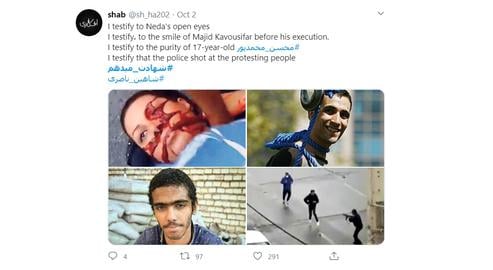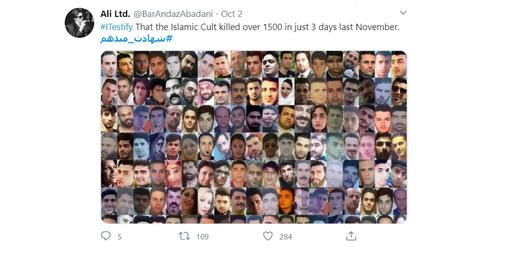In the first week of October thousands of Iranians have joined a virtual campaign in a bid to shatter censorship in Iran and bear witness to atrocities committed in the country since 1979. The #We_Testify hashtag is being used to highlight criminality and violations of human rights in the Islamic Republic over the past 41 years that have not been rightly covered by the media inside Iran itself.
Iran’s domestic media is blighted by a near-total dearth of first-hand or uncensored information. The national Islamic Republic of Iran Broadcasting (IRIB) is a mouthpiece for the Islamic Republic while the reporting power of newspapers and news agencies has atrophied over decades of arrests, reprimands, fines and closures for the slightest transgression. Most have now embraced self-censorship as a matter of course.
The #We_Testify campaign seeks to highlight this issue, with users re-telling stories of incidents in Iran from the last four decades. Among them so far have been the burning down of Cinema Rex in Abadan in 1978, internet outages and state-sponsored murders of writers and activists.
Barbs Aimed at the IRIB
Several users have used the #We_Testify hashtag to draw attention to the total lack of independence of the IRIB, Iran’s official state broadcaster. One user wrote: "I testify that the IRIB is a controlled media [outlet]."
Another highlighted the role of IRIB journalists in helping security agents obtain forced confessions from prisoners in Iran, which are then often aired on television as a form of coercive propaganda.
Activist Shima Babaei also made bitter mention of the IRIB in her post about the downing of Ukrainian Airlines Flight 752 by the Revolutionary Guards in January this year. “I testify,” she wrote, “that when they shot down the Ukrainian plane with two missiles, a foetus burned in her mother's womb, Farideh. Brides and grooms were killed. What was left of the 176 people on board were dolls, shoes, and a few photos. I testify that on the morning of the crime, they celebrated their ‘severe revenge’. They handed out sweets in the streets and laughed at the nation on the IRIB."
Horrific Incidents in Iran’s Recent History Unearthed
On the night of August 19, 1978, hundreds of people had gathered at Cinema Rex in the city of Abadan, Khuzestan province, to watch the movie The Deers. Islamist militants doused the building in airplane fuel before setting it alight and blocking the doors. At least 470 people were killed in the ensuing blaze.
A Twitter user named Saman Moghaddam used the #We_Testify hashtag to remind people of the tragedy, writing of the Iranian regime: "I testify that according to their own confession, they wanted to provoke people because the revolution had lost its momentum... and blamed it on the Shah.”
Many of the tweets in the #We_Testify campaign referred to killings and arrests during nationwide protests in Iran, as well as the regime’s ham-fisted attempts to control the flow of information about them. One user wrote: "I testify that in November 2019, they cut off the Internet for ten days and shot at the heads and hearts of 1,500 people who protested peacefully against 40 years of corruption." Another said: "I testify that that the massacre took place behind closed doors and when the Internet was cut off."
Others have drawn attention to the killing and oppression of Iranian writers and artists. Babak Ghafoorizar, a reporter for Radio Farda, wrote: "I testify to the execution of the director, to the execution of the writer, to the execution of the poet, to the execution of Saeed Soltanpour”: referring to the celebrated Iranian playwright sentenced to death for his opposition to the Islamic Republic in 1981.
Many more Iranian users deployed the #We_Testify campaign to re-raise the specter of the chain murders of 1988-199, in which many Iranian dissident intellectuals were killed or disappeared on the orders of the regime. Among the many victims named in the posts were the writer Mohammad Mokhtari, the translator Mohammad Jafar Poyandeh, writer Ali-Akbar Sirjani, translator Ahmad Mir-Alaei and poet Hamir Hazijadeh. “This repression is still going on,” one user wrote, referring to the recent imprisonment of three more members of the Iranian Writers’ Association. “But our voice will never be silenced."
Still others have written about the killing and censorship of journalists and bloggers in Iran. A user named Alireza wrote: "I testify that Yaghoub Mehrnahad, an innocent Baluch journalist and blogger, was executed. His main crime was to make demands in a province that has been run by security forces for years."
Another user wrote about Ruhollah Zam, the former director of Amad News who has been sentenced to death in Iran: "I testify that Ruhollah Zam is a journalist who only reported events, without censorship. His crime was revealing the secrets of the establishment and informing the people."
The case of the blogger Sattar Beheshti, who was murdered in custody by security agents in 2012, was also raised by some Iranian Twitter users, with one simply writing: "I testify that you killed Sattar Beheshti under torture."
Hidden Issues Brought Back into Light
Some of those taking part in the #We_Testify campaign have used it to shed light on aspects of day-to-day life in Iran that often go unreported on. In the 2020-21 academic year, gendered amendments to school textbooks led to criticism of the Ministry of Education. One user wrote: "I testify that in the 21st century, the Islamic government removed Iranian girls' pictures from the cover of the mathematics textbook” while another added: “They could not even tolerate the picture of a girl."
Others weighed in on the issue of religious minorities being denied access to education in Iran, with one user writing: “I testify that Baha'i children were not allowed to go to school, and that they would go to a neighbor's house to ask for textbooks."
Countless other whole-society issues in Iran that have received scant media attention for fear of reprisal or escalating protests were mentioned under the #We_Testify hashtag. They have included the dismemberment of two children in Sistan and Baluchestan by a crocodile, the killing of Kermanshah mother-of-seven Asieh Panahi and the destruction of her home because she did not have a permit, the ill-treatment of kulbars in Iran, acid attacks on women in Isfahan, the arrest and conviction of civil activists and employees at the Haft Tappeh sugarcane facility, the execution of a man in Mashhad for drinking alcohol, and scores of others that these writers in cyberspace believe must not be forgotten.
Related coverage:
Decoding Iran's Politics: The Chain Murders of Dissidents
Blog: Then the Lie Became Great in the Country...
Banning Cucumbers and Wet Bisons: Absurd Censorship in Iran
Veteran Photographer: Political Coverage in Iran is Finished
visit the accountability section
In this section of Iran Wire, you can contact the officials and launch your campaign for various problems



























comments